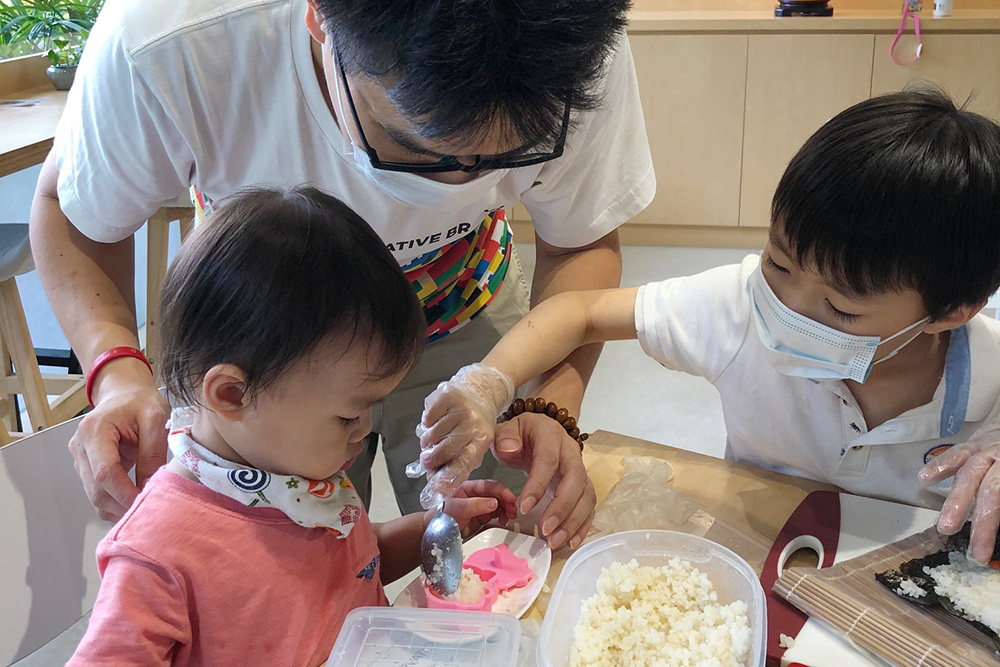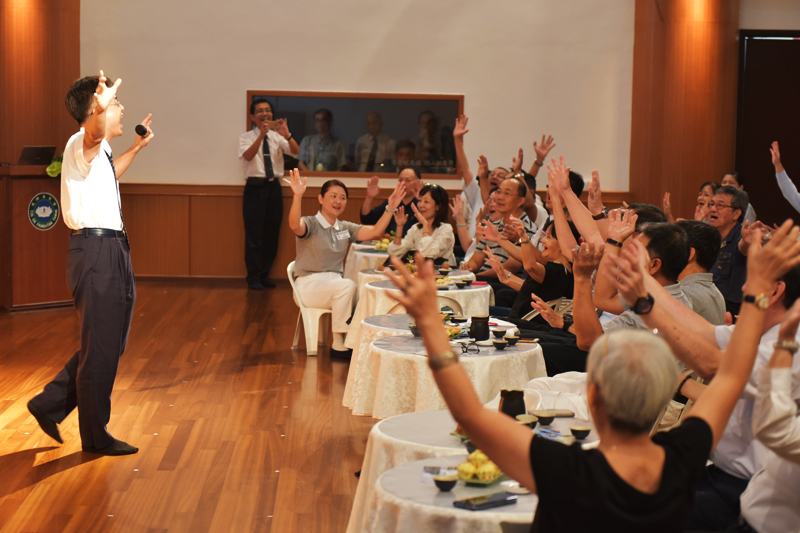Former CEO of Tzu Chi Singapore David Liu giving a talk at a volunteers’ training session, sharing invaluable insights he has gained from working under Dharma Master Cheng Yen. Photo by Chua See Siew
David Liu, who relinquished his position as the CEO of Tzu Chi Singapore four years ago, has a special affinity with Singapore and Malaysia. He has been closely following Dharma Master Cheng in Jing Si Abode in Hualien, Taiwan, in these few years, helping to plan for international disaster relief efforts and seeking her advice at critical times. In addition, he is personally involved in disaster relief work and also assists various overseas Tzu Chi offices in developing their missions.
When others asked what he had been busy with in the Abode, he jokingly replied, “I’ve been ‘busy waiting’ (for opportunities to give of myself).” While doing Tzu Chi’s work, Liu is very clear about when to persevere and persist, and when to yield and let go. He seizes every opportunity to contribute his skills and knowledge, but does not claim credit for his myriad accomplishments.
“When an opportunity arises, we must not hesitate to seize it. (However, when it is time to let go), we should willingly let it go,” said Liu.
“Emptying Our Minds”
In his talk, Liu emphasized that effectiveness in communication depends largely on non-verbal aspects ─ words (the literal meaning) account for only 8% of the overall message, while thoughts, feelings, tone of voice, and attitude account for 92% of the message.
He shared that while interacting with guests and visitors at the Jing Si Abode, he always made it a point to show respect and empathy for them. In this way, they were able to sense his sincerity and goodwill. Thus, heated and unpleasant confrontations could be avoided.
Liu reminded volunteers to constantly examine and reflect upon themselves. This is because our thoughts can often be revealed through our actions. If we speak harshly and inappropriately, it will reflect our delusions and arrogance. Conflicts in interpersonal relationships mainly arise from differences in people’s opinions, and learning Buddhism is about learning to get rid of the afflictions of greed, anger and ignorance.
“When we have expectations of others, we are asking for something in return. When we stubbornly think that our ideas are better than others’, we are being unreasonable. If we often see things based on our subjective biases and opinions, we will make mistakes in our judgement,” observed the stalwart Liu.
“When erroneous views are spread, are we able to clear up our confusion and help set right the minds of the wayward and the deluded?” Liu explained that the reason why we have negative or unwholesome thoughts is because we do not have the habit of thinking in a positive way. As such, he exhorted the volunteers to develop positive thinking and to cultivate Master Cheng Yen’s Right Faith and Right Mindfulness. He gave the analogy of an empty vessel to explain how we can progress in our spiritual practice: “We must learn to empty our mind – (turn our mind into an “empty vessel”). Then we can add purifying Dharma water into it and purify ourselves as well as others. We should not harbour any biases.”
Clearing Mental Blockages and Harboring Gratitude
Liu stressed in his talk that volunteers should not be so occupied (with Tzu Chi’s work) that they lose their sense of direction and purpose. Then they would not do the wrong thing. “When we reform ourselves, we are helping ourselves. When we inspire others, we are helping others. Tzu Chi volunteers can awaken to life’s principles as they diligently learn the Dharma, go amongst people to serve and cultivate their minds at the same time.”
“Take the Mission of Environmental Protection, for example. Recycling work is a tangible expression of ‘skillful means’. But this ‘skillful means’ embodies ‘spiritual recycling’ (i.e. purification of the mind). If a volunteer diligently does recycling work but does not take the Dharma to heart, he will not be able to change his perspective and transform his mindset (to a positive one) when he encounters setbacks. He will be overcome by challenges and hence cannot fulfill his spiritual aspirations,” added Liu, astutely.
He further pointed out that most things in life do not happen according to our wishes – if we keep focusing on negative things, we will feel very miserable indeed. If we can focus our attention on things that go well, and harbour gratitude in our hearts instead of complaining, we will naturally have fewer afflictions regardless of the external circumstances we face.
“What we should worry about is that we are late in awakening to and realizing our mistakes. When we harbour even a little unhappiness, it means that our minds are not pure. So we must often reflect on ourselves. (Without a clear and pure mind, we will never have happiness.) Many a time, our mind and not our path is blocked.”
Another speaker, Chen Zhi Yuan, who is a volunteer from Taipei, shared about his experience walking on the Tzu Chi Path. In the past, he used to live a rather comfortable and relaxed life in the United States, but often felt bored and listless. Later he discovered Tzu Chi and was inspired to join the volunteer training programme. In the process, he was able to get rid of his bad habits and also learned to practise repentance. He reminded everyone that everything originates from the mind, which is often shrouded in delusions. “Many of the problems we face can be easily solved if we humble ourselves and be tolerant and courteous,” he said.
The two speakers’ heartfelt and deep sharing struck a deep chord in the hearts of many in the audience. Chen Run Fu, who has been a community volunteer leader for eight years, revealed that he would sometimes encounter challenges in his dealings with fellow volunteers. “Everyone has his own point of view. So I need to be open-minded and constantly practise gratitude so as to form good karmic connections with people.”
Chen injured his hand in a recent accident and was touched by the love and care shown by the volunteers in his community.
“What really warms my heart is the continual flow of messages and phone calls that I’ve been receiving, so I do not feel alone at all. Even those who have had disagreements with me would come and show their concern, which made me very surprised (and happy),” shared Chen. He hoped to focus more on the positive attributes of others and also serve as a bridge between people.
Before ending his talk, Liu declared, “True success is not about how many people you can beat, but rather it is about how many people you can help. (It may not be easy to find many needy people who need help in prosperous Singapore), but if people can persist (in doing charity work), it would be truly precious.”



